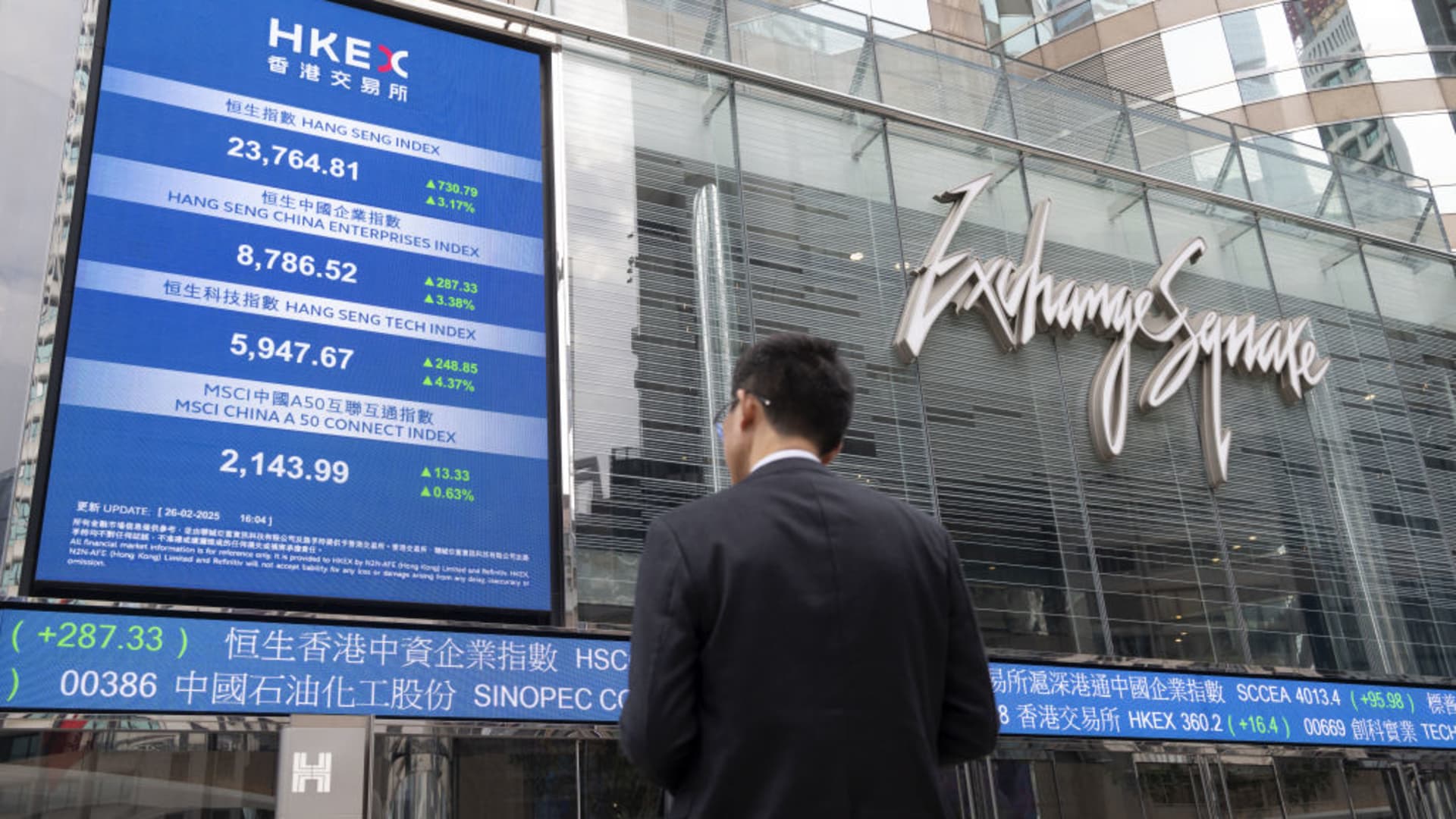The Exchange Square Complex, which houses the Hong Kong Stock Exchange, on Feb. 26, 2025.
Bloomberg | Bloomberg | Getty Images
BEIJING — Chinese companies are jumping at a window of opportunity to go public in Hong Kong as global investors start to return to the region, following the news of DeepSeek’s artificial intelligence breakthrough in late January.
It’s a level of excitement that has not been felt for more than three years, despite the overhang of U.S. trade tensions. Initial public offerings are a lucrative way for early investors in startups to exit and reap a return.
“Everyone is working so perfectly together. IPO candidates, the investor and the regulators,” said George Chan, global IPO leader at EY. “All these three parties are working so perfectly at this moment to actually cultivate a healthy Hong Kong IPO market.”
“The U.S. long-term fund has returned. It shows investors are getting more confident [about] China,” he said, adding that post-IPO performance has also been encouraging.
Chinese bubble tea giant Mixue went public on March 3 in a highly oversubscribed Hong Kong listing. And in a sign of more to come, Chinese battery giant Contemporary Amperex Technology (CATL) filed in February for what could be Hong Kong’s largest IPO since 2021, when short-video company Kuaishou listed.
News of China-based DeepSeek’s claims to rival OpenAI’s ChatGPT in reasoning capabilities at a lower cost — despite U.S. restrictions on Chinese access to advanced chips for training AI models — hit global tech stocks in late January, while spurring a rally in China. Hong Kong’s Hang Seng index surged to three-year highs.
Chinese President Xi Jinping also held a rare meeting with tech entrepreneurs in February, and Beijing has signaled greater support for the private sector, after taking a more restrictive stance in recent years.
Six initial public offerings in Hong Kong raised more than 1 billion Hong Kong dollars ($130 million) in the first quarter — a jump from just one listing of that size in the year-ago period — according to KPMG.
In all, the consultancy said, Hong Kong saw 15 IPOs in all of the first quarter which raised 17.7 billion HKD — the best start to a year since 2021.
There’s still a long way to go before recovering to that level. Hong Kong saw 32 IPOs in the first quarter of 2021 that raised a whopping 132.7 billion HKD, according to KPMG.
The Hong Kong stock exchange has adjusted its listing rules in the interim, including ones that support companies already listed in mainland China to offer shares in Hong Kong.
In addition to CATL, other companies listed in mainland China — Hengrui Pharmaceuticals, Mabwell, Haitian Flavoring and Food, Fortior Tech and Sanhua Intelligent Controls — are “actively seeking Hong Kong listings,” said Tiger Brokers, an underwriter of many Chinese companies’ IPOs in the U.S. and Hong Kong.
“Chinese regulators are encouraging companies to list in Hong Kong to broaden financing channels and support the outbound merger and acquisition needs of Chinese enterprises,” the firm said.
Still not out of the woods
Back in the summer of 2021, the fallout over Chinese ride-hailing company Didi’s IPO in the U.S. prompted both countries’ regulators to scrutinize what was then a wave of Chinese companies listing in New York.
The major issues have since been resolved and Beijing has clarified rules for Chinese companies wanting to list outside the mainland. But the Trump administration indicated in its “America First Investment Policy” that it could increase scrutiny on U.S. capital flowing to China, on top of heightened tariffs.
The U.S. and China have yet to indicate when their two leaders might meet in an attempt to forge a deal. A surge of interest in AI and tech are also not yet enough to speed up a recovery in China’s economy.
“At this point in time, all we can see is the good indicators,” EY’s Chan said. But “there could be one single incident happening which could pretty much reverse the trend.”
“Things tend to have a pattern,” he said. “If things can keep on for three months, four months, it will likely continue for the rest of the year.”

 Blog Post7 days ago
Blog Post7 days ago
 Economics1 week ago
Economics1 week ago
 Finance1 week ago
Finance1 week ago
 Economics1 week ago
Economics1 week ago
 Economics1 week ago
Economics1 week ago
 Personal Finance1 week ago
Personal Finance1 week ago
 Economics1 week ago
Economics1 week ago
 Accounting1 week ago
Accounting1 week ago










